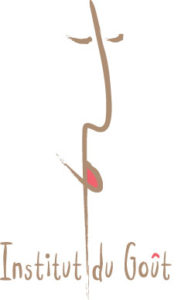 Today, you are the President of the Institut du Goût, would you tell us how this came about?
Today, you are the President of the Institut du Goût, would you tell us how this came about?
Jacques Puisais, founder of the French Institut du Goût and inventor of the concept of taste education for children, asked me in the spring of 2018 to take over as president of the Institute. I have been working with him for over ten years now and I have learnt so much from him. I was already sensitized, by my education, to culinary pleasures, and more precisely to this choice, both cultural and political, which consists of making food one of our household’s crucial investments, in terms of time and money. Similarly, it was through my parents that I learned about the geographical diversity, and therefore the diversity of food, throughout France. They sensitized me to this French specificity: the secular understanding of the terroir, that is to say the marriage between climatic and geological data and human know-how. Finally, my passage through the national education system, then my years of journalism specializing in education issues have allowed me to deepen a subject that is for me the most essential of all; that of transmission and the emancipatory role of knowledge. Taste and the capacity to name sensations, which are the central focus of the Institut du Goût’s work, perfectly join this certainty which inhabits me; that control of a language, the possibility for an individual to conceive the world surrounding him and put it into words, is a groundwork of freedom that schools must build on.
I have since met my match in Jacques Puisais as one of those men whom the Japanese call “living treasure”, a philosopher and a taste humanist as well as a biologist curious about everything. Since the creation of the French Institut du Goût in 1976, he has developed this intuition (which is finally shared by the public authorities) that the individual can emancipate himself only if he becomes aware of what is going on within him as he feeds and as he regains control of his consumption. The Institut du Goût’s work, since its creation, has consisted of mixing scientific research and pedagogical reflection to develop a detailed understanding of the mechanisms that are at work in the act of eating by insisting on the poly-sensory dimension of taste, and to train free men and citizens to become accountable for their consumption.
What is your plan of action for bringing taste to schools? And what are your goals for the future?
Classes su Goût were originally designed by Jacques Puisais as the preferred tool to educate future adults. Children aged 7-8, as soon as they are old enough to master vocabulary and are still open to discovery, not yet formatted by the industry, are an ideal audience. Since 1975, the French Institut du Goût has worked to implement a specific pedagogy drawn on teacher training, so as to integrate taste into the overall concepts that animate their work. We have all the necessary tools to train these teachers and to allow them, autonomously, to give rise to essential questions among students. Unfortunately, for a very long time, this work remained confidential due to politicians’ lack of involvement and who were unaware of the importance of these topics. The hours of teacher training were cut off and the impetus wasn’t sufficient. Today, we can see how innovative and visionary the French Institut du Goût’s work was. The fact of starting with a child, his sensations, to teach him, not nutritional rules or a food standard, but to make him wonder if the product he ingests speaks to him, tells him its story, its place of origin, its authenticity.
We are therefore redeploying our training so as to offer it to more teachers. We will also involve local authorities, since they are the ones who manage the schools, and especially canteens, which must become the first gateway for a child in a process of sensory awakening.
Can taste and its apprenticeship be an integrative factor for children from other cultures? And how can this help shape tomorrow’s citizen?
The development of children’s sensoriality through the awakening to taste is indeed the best factor of integration there is. Sharing a meal and living the same sensations at the same moment, all the while understanding that the other person does not necessarily perceive things as we do, that it can be more acid or more bitter, that the person could be more sensitive to certain signals, is to enter into the awareness for otherness and take a first step towards empathy. But above all, the awakening to taste, supported, as does the pedagogy of the Institut du Goût, on the attention paid to the authenticity of the product, its history and geography, allows everyone to understand that they will feel at home anywhere they are as long as they understand the climate of the place and the sensoriality attached to it. This is the real territorial principle. Wherever man finds himself, he can perceive the specific light of the place, its winds, and its geology, which the products render him. And he integrates himself by opening up to this place, understanding it intimately. It is also through this work that he can learn to respect the place, the season, everything that does not depend on him and that the industrial processes are trying to erase. In doing so, he opens himself up to others, who are also his fellow-men, and to this land from which he perceives how much it is necessary to preserve its integrity. Here we find all the issues that will make the world of tomorrow.
 What do you think are the differences between taste education and nutrition education?
What do you think are the differences between taste education and nutrition education?
The difference is fundamental even if it is not yet well perceived by public authorities. Nutritional education consists in explaining to children the value of each food in terms of calories, sugars, and proteins. It is a public health discourse that the child will more or less absorb, but that will not change the way he consumes. If the products saturated with fat and sugar awaken impulses in him, no nutritional discourse will come to counter them, except to create a frustration which at a given moment will have its counterpart. On the contrary, sensory awareness education teaches the child to find pleasure in the subtlety of a crisp or soft consistency, in the delicacy of an aroma of grass or flower, in a multitude of feelings that belong to him. He learns to indulge himself with a real piece of crunchy bread, or with a glass of milk that is really tasty. And he will spontaneously turn away from lying products and empty calories that will bring him nothing.
Can Classes du Goût be taken out of the country and adapted to other food cultures?
According to this idea that sensoriality is the learning of the true right of the soil, it is absolutely universal. Each country can discover its terroirs; each region has its products, which are a reflection of its geography. Classes du Goût are therefore the instrument to understand the place where you are and feel good. The pedagogy that the classes deploy can adapt to any food culture, which explains why the program works so well in Guadeloupe and Polynesia as it does in France. Developing the classes at a European level would be the best way to create a link between the different countries of the continent, since each child, aware of the specificity of his heritage, would be prepared to open up to those of other European countries. It is the best way to create a link between young Portuguese and young Danes, between young Greeks and young Irish people, to prepare them to discover and love the European food heritage rather than to leave them in the grip of a standardization that only leads to ignorance and indifference.
Contact:
Projects and Training Director
Nathalie Politzer
Institut du Goût, 28 Avenue Aumont, 60500 Chantilly, France
E-mail : npolitzer@idg.asso.fr

















